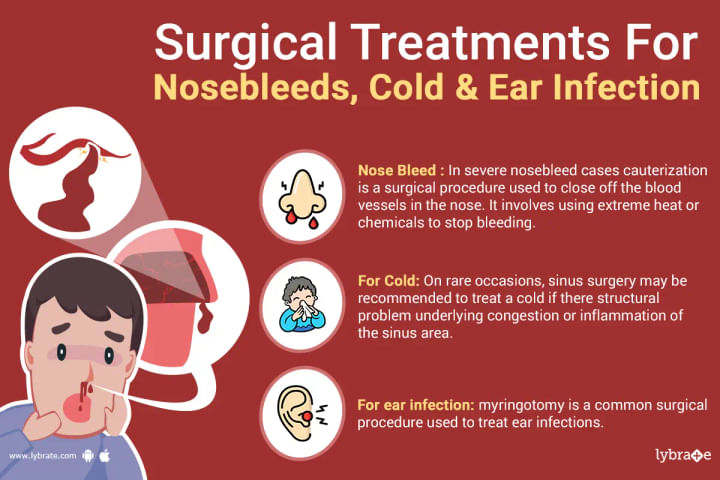The Most Common ENT Problems in Kids Treating Nosebleeds, Colds, & Ear Infections
What are Nosebleeds, Colds, & Ear Infections?
Nosebleeds, Colds, & Ear Infections are three very common types of illnesses and injuries that can affect both children and adults.
- Nosebleeds occur when the capillaries in the nose rupture, causing blood to be released from the nostrils.
- Colds are respiratory infections caused by a variety of viruses, consisting mainly of sneezing, coughing, and sore throat.
- Ear infections can refer to either a middle ear infection or an outer ear infection (otitis externa), which is an infection of the external part of the ear canal that typically presents with redness, tenderness and pain.
Although these conditions may have different causes, treatment for all three involves rest, fluids and sometimes medications such as antihistamines or antibiotics.
What are possible Complications of Nosebleeds, Colds, & Ear Infections?
Nosebleeds, colds, and ear infections can have a variety of potential complications that can occur in mild to severe cases.
- When it comes to nosebleeds, complications that can arise include pre-existing medical issues like high blood pressure, or serious conditions like profuse bleeding or shock.
- Furthermore, in rare cases epistaxis (prolonged nosebleeds) could lead to anaemia due to heavy blood loss and fatalities from aspiration of blood into the lungs and airway occlusion.
- In regards to colds, individuals who are immunocompromised are more vulnerable to developing severe bacterial infections such as pneumonia which often necessitates hospital stay and antibiotics.
- In some rare cases untreated upper airway infection may lead to life threatening meningitis as rhinovirus crosses the epithelial barrier into the subarachnoid space.
Ear infections can also bring about various types of complications depending on the severity of infection including damage to the eardrum leading to hearing problems and fluid buildup within the middle ear space resulting in balance disturbances.
Most concerning is spread of infection from mastoid bone into surrounding brain parenchyma leading to intracranial abscesses which require surgical management for treatment.
The Most Common ENT Problems in Kids: Treating Nosebleeds, Colds, & Ear Infections
Nosebleeds, colds, and ear infections are some of the most common ailments among children. They can be both a source of fear and anxiety for parents, as well as just plain unpleasant for the little ones. Effective treatment is key to minimising disruption for both children and adults alike.
Nosebleeds:
- Minor nosebleeds occur in up to 60% of children before their tenth birthday, especially during winter months when the air is dry.
- Nosebleeds in kids are usually harmless and typically caused by picking or nose blowing, although allergies can also contribute to them. Fortunately minor nosebleeds can be treated at home with effortless ease—most often, simply leaning forward with head slightly tilted downward will help stop blood flow from the nostril in a matter of minutes.
- Applying ice or a cold compress to your child’s face and applying gentle pressure near the nasal area may also assist in stopping the bleed quicker.
- However, if symptoms persist or worsen you should see a doctor right away because it could require further medical attention like cauterization (a procedure where heat is used to seal broken vessels) on rare occasions.
- For nosebleeds, put some drops of warm ghee in each nostril. This lubricates the area and helps prevent dryness which can cause nosebleeds.
- Make a compress with cotton and cold water, fold it into thick pad shape and apply it on the nose. This will calm down bleeding and reduce swelling that may be causing the bleeding.
- Sit up straight and slightly tilt your head forward to avoid swallowing blood.
- Apply pressure on either side of the nostrils for a few minutes till bleeding stops completely.
Colds & Flu:
- Colds are usually caused by infectious viruses that travel through droplets in the air when someone sneezes or coughs without covering their mouth and spread quickly throughout families/communities.
- Colds often start with sneezing but then move onto other symptoms such as runny nose, sore throat congestion, coughing etc..
- Unfortunately there is no exact cure for common cold however several remedies like keeping your home environment humid (by using humidifier), natural soups/ steam therapy for sore throat and rest might help provide relief and shorten duration of illness.
- It's important to administer mild over-the-counter medications like ibuprofen (advil) or acetaminophen /paracetamol (tylenol) however always consult with a doctor when giving a child any sort of medication given their age & weight dependent dosing instructions .
- Boil a cup of water with freshly cut ginger slices for about 5 minutes. Strain it and add honey for flavour. Drink this several times a day to help reduce phlegm and congestion associated with colds.
- To reduce muscle aches, stomachache, headache and fever that may accompany colds, you can drink warm water mixed with ayurvedic herbs like ashwagandha or tulsi that have anti-inflammatory properties.
Note: flu shots available annually that help protect against influenza virus are strongly recommended by American Academy Pediatricians !
Ear Infections:
- Ear infections in particularly middle ear infection are also very common among young children 3 years old & younger/ who aren’t vaccinated against it yet due prevalence bacteria spread diaper changing; however anyone exposed could contract an ear ache if exposed directly to the infected person-through saliva kissing etc
- Most earaches resolve on their own , though sometimes infection may require antibiotics . Indications include prolonged fever above 38 degrees(100 f), severe pain lasting more than 24 hours resulting from recurrent episodes -in these cases seek medical attention right away!
- Various home remedies can go a long way towards providing relief such warm compresses reduce swelling discomfort ,mild medications alleviating pain as well ensure all liquid medicated drops/dripped into the ear very slowly so all doses get absorbed properly -do not lay down immediately after applying drops make sure they settle in first!
- Boil some garlic in sesame oil until it turns black then strain it. Put 2-3 drops into your ear providing immediate relief from earache caused by infection
- Make a paste of fenugreek seeds soaked overnight in mustard oil to be applied around the ear before bedtime will also reduce pain
- Add easily available nettle leaves or peppermint leaves in boiling water to make an infusion tea; after cooling put 2-3 drops into affected ear every 3-4 hours
What are the surgical treatments for Nosebleeds, Colds, & Ear Infections?
Nosebleeds, Colds, and Ear infections are all uncomfortable health issues that can affect people of all ages. They can be managed with at-home measures such as rest, hydration, and over-the-counter medications. However, in some cases surgery may be required to treat these ailments.
-
For Nosebleeds: In severe nosebleed cases where at-home care has failed or medical advice is needed, cauterization is a surgical procedure used to close off blood vessels in the nose. It involves using extreme heat or chemicals to stop bleeding. The procedure can be performed under local anaesthetic either in the doctor’s office or in an outpatient setting.
-
For Colds: On rare occasions, sinus surgery may be recommended to treat a cold if there is a structural problem underlying the congestion and/or inflammation of the sinus area that cannot be obtained with normal treatment. This type of surgery typically involves making small incisions in order to access the sinuses directly; and removal of blockages or growths as necessary (e.g.,polyps).
-
For Ear Infections: Myringotomy is a common surgical procedure used to treat ear infections caused by fluid accumulation behind the eardrum due to allergies, viruses, bacteria and/or other causes. During this procedure a small incision is made into the eardrum allowing access for draining of fluid from inside the ear tube through suctioning and/flushing out any debris which may have collected there as well as administering antibiotics directly into this area if necessary .
Best doctors to consult for Nosebleeds, Colds, & Ear Infections?
Nosebleeds, colds and ear infections can all be treated by a primary care doctor. However, depending on the severity of the issue, a visit to a specialist may be necessary.
- Ent specialists: For nose bleeds in particular, an otolaryngologist would likely be the best choice since they specialise in nose and throat conditions.
- Allergist: For colds and ear infections, an allergist or ENT (ear, nose and throat) specialist may be more suitable for diagnosis and treatment.
- Paediatrician: A paediatrician should generally be consulted for any children affected by these conditions.



+1.svg)
